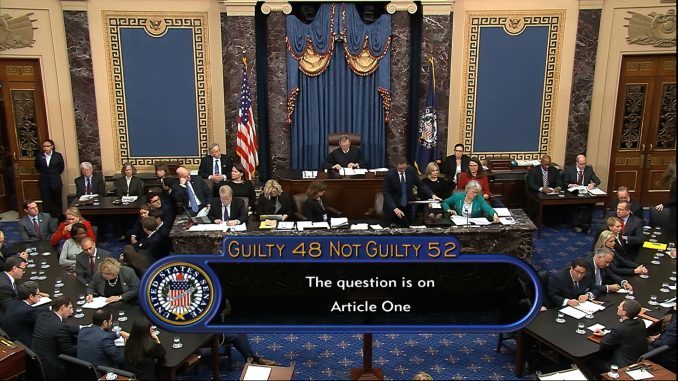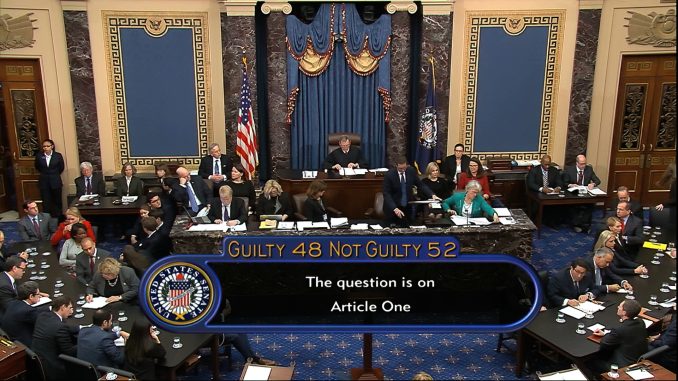

WASHINGTON, D.C. — President Donald Trump was acquitted by the U.S. Senate after a trial on two articles of impeachment. The votes bring to a close only the third presidential impeachment trial in American history and serve as a start of the 2020 race for the White House.
With Chief Justice John Roberts presiding, senators stood at their desks to state their votes for the roll call — “guilty” or “not guilty” — in a swift tally almost exclusively along party lines. Visitors, including the president’s allies, watched from the crowded gallery. Roberts read the declaration that Trump “be, and is hereby, acquitted of the charges.”
The outcome followed months of impeachment proceedings which began in the House of Representatives and ended with two weeks of Senate proceedings.
The allegations from the Democrat-controlled House were summed up in a far-reaching, 28,000-page report compiled by House investigators accusing Trump of engaging in shadow diplomacy for political gain. Democrats alleged that Trump withheld aid to Ukraine while asking them to investigate Democratic rival Joe Biden ahead of the next election. Trump, and the Ukrainian president, denied such a “quid pro quo” existed.
No president has ever been removed by the Senate.
Trump had predicted vindication, deploying the verdict as a political anthem in his reelection bid. The president claims he did nothing wrong, decrying the “witch hunt” and “hoax” as extensions of special counsel Robert Mueller’s probe into Russian 2016 campaign interference by those out to get him from the start of his presidency.
Trump’s political campaign tweeted videos, statements and a cartoon dance celebrating that he was “vindicated.” Trump himself tweeted that he would speak from the White House on Thursday about “our Country’s VICTORY on the Impeachment Hoax.”
However, the Senate Democratic leader Chuck Schumer said there will always be “a giant asterisk next to the president’s acquittal” because of the Senate’s quick trial and the Republicans’ unprecedented rejection of witnesses for an impeachment.
A majority of senators found Trump not guilty on the two articles of impeachment. Two-thirds “guilty” votes would have been needed to reach the Constitution’s bar of high crimes and misdemeanors to convict and remove Trump from office.
On the first article of impeachment, abuse of power, the vote was 52-48 favoring acquittal. The second, obstruction of Congress, also produced a not guilty verdict, 53-47.
Only one Republican, Mitt Romney of Utah, the party’s defeated 2012 presidential nominee, broke with the GOP on the allegation of abuse of power.
Romney choked up as he said he drew on his faith and “oath before God” to vote guilty on the first charge. He voted to acquit on the second allegation of obstruction of Congress.
Both Bill Clinton in 1999 and Andrew Johnson in 1868 drew cross-party support when they were left in office after impeachment trials but they also had bipartisan votes for their impeachment in the House.
Ahead of Wednesday’s voting, some of the most closely watched senators took to the Senate floor to tell their constituents, and the nation, what they had decided.
Influential GOP Sen. Lamar Alexander of Tennessee, who is retiring, worried that a guilty verdict would “pour gasoline on the fire” of the nation’s culture wars over Trump. He said the House proved its case but it just didn’t rise to the level of impeachment.
Other Republicans siding with Trump said it was time to end what McConnell called the “circus” and move on. Trump ally Lindsey Graham said it was a “sham” designed to destroy a presidency.
All Senate Democrats voted guilty on both articles of impeachment.
“I’ve always said, if I can go home and explain it, I can vote for it,” said Sen. Joe Manchin, D-W.Va., a centrist from a Trump state who stunned some by voting the president guilty. “I can explain my vote based on the evidence.”
Among senators running for the Democratic presidential nomination, Bernie Sanders, Elizabeth Warren and Amy Klobuchar dashed back from New Hampshire to vote.
During the nearly three-week trial, House Democrats prosecuting the case argued that Trump abused power when he pressured Ukraine to investigate Biden and his son, Hunter Biden, ahead of the 2020 election. Trump temporarily halted U.S. aid to the struggling ally battling hostile Russia at its border. The money was eventually released in September as Congress intervened.
When the House probed Trump’s actions, the president sought a court decision on whether his staffers would have to comply with subpoenas. Democrats argued that this constituted obstruction of Congress.
One key Democrat, Alabama Sen. Doug Jones — perhaps the most endangered politically for reelection in a state where Trump is popular — announced he would vote to convict. “Senators are elected to make tough choices,” Jones said.
House Democrats may yet summon former national security adviser John Bolton to testify about leaked comments from his forthcoming book about Trump’s actions.
In closing arguments for the trial the lead prosecutor, Rep. Adam Schiff, D-Calif., said he hoped the votes to convict “ will serve as a constraint on the president’s wrongdoing.”
“But we’re going to have to be vigilant because this is not a president who is guided by any kind of moral compass,” he told The Associated Press.
Pelosi was initially reluctant to launch impeachment proceedings against Trump when she took control of the House after the 2018 election, dismissively telling more liberal voices that “he’s not worth it.”
Trump and his GOP allies in Congress argue that Democrats have been trying to undercut him from the start.
The result of the impeachment process was the quickest, most partisan impeachment in U.S. history, with no Republicans joining the House Democrats to vote for the charges, though one GOP congressman left the party and voted for impeachment and two Democrats joined Republicans to oppose. The Republican Senate kept up the pace with the fastest trial ever.
Trump’s legal team with star attorney Alan Dershowitz made the assertion that even if the president engaged in the quid pro quo as described, it is not impeachable, because politicians often view their own political interest with the national interest.
Ultimately, McConnell, and the Republican majority, refused efforts to prolong the trial with more witnesses, arguing the House had heard witness testimony and House impeachment managers said they had proven their case.
Trump’s approval rating hit a new high of 49% in the latest Gallup polling, which was conducted as the Senate trial was drawing to a close. The poll found that 51% of the public views the Republican Party favorably, the first time the GOP’s number has exceeded 50% since 2005.



